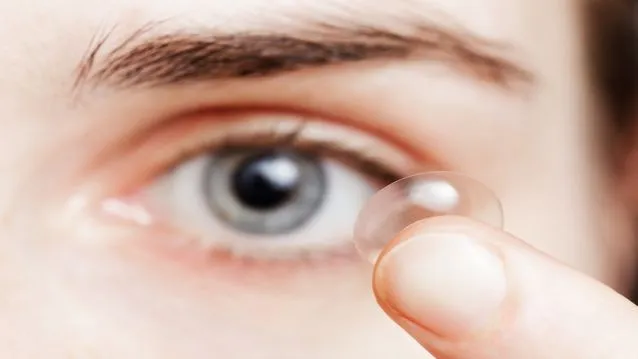Millions of people across the globe wear contact lenses as a comfortable, hassle-free alternative to glasses. Most contact lens wearers simply pop their contacts in their eyes every day with little thought given to hygiene or proper lens care. However, recent research suggests that this may cause serious damage to the eyes or even permanent blindness.
This study published in the British Journal of Ophthalmology has found a significant increase in the documented cases of Acanthamoeba keratitis, which is a preventable eye infection caused by a single-celled organism known as Acanthamoeba. Researchers in England have been tracking this outbreak since 2011 and have noticed a trend. 90% of affected patients are contact lens wearers, with many admitting to improper lens hygiene such as swimming or bathing while wearing contacts and not practicing proper handwashing guidelines before touching lenses. This infection causes the cornea to become inflamed and extremely painful and causes damaged eyesight in most cases.
While this infection is still extremely rare, it is important to understand the dangers associated with subpar hygiene in regards to contact lenses. Professor John Dart in a statement regarding the research he and his team put together said, “This increase in cases highlights the need for contact lens users to be aware of the risks.”
Thankfully, Acanthamoeba keratitis is easy to prevent with appropriate lens care and diligence. Here are a few tips to ensure that your eyes stay healthy and free of any dangerous infections.
Wash hands
Though it may seem like a no-brainer, many contact lens wearers fail to wash and dry their hands before handling lenses. Our hands come into contact with thousands of microscopic bacteria and debris during any given day that can make their way into your eyes and cause irritation. Wash hands with warm water and soap and dry on a clean hand towel.
Avoid getting water on your lenses
Remove contact lenses before swimming, showering, bathing, or any other activities that could cause your lenses to get wet. Never rinse your contacts in water and only use contact lens solutions approved by eye doctors.
Never sleep in contacts
We’ve all been guilty of accidentally falling asleep and forgetting to remove our contact lenses at some point. While one time isn’t going to prove disastrous, making a habit of sleeping or napping in your contacts can cause serious complications. In fact, this has been linked to a 15% increase in the risk of developing an eye infection.
Don’t “top off” solutions
Many contact lens wearers think that it is fine to simply top off the solution in their contact case instead of changing it completely. This can cultivate unhealthy bacteria and prevents your contacts from actually getting clean because after a few hours any of the actual disinfectant in the solution is no longer present.
Replace lenses and cases
It is essential that you follow your eye doctors instructions and replace contacts as often as they recommend rather than trying to stretch their lifespan. Replace lens cases every three months as invisible bacteria build up in the case and cling to your contacts.
Be sure to schedule regular eye exams
Visits to the eye doctor shouldn’t happen only when you think your prescription has changed or you need to order more contacts. Yearly checkups are an important part of optical health. Eye doctors check for infection, eye disease, and make suggestions if they feel you would do better with a different type of contact lens.
Properly clean lenses
Not only should you be sure to wash your hands, but it is also vital that you wash your contacts as well. Rinse them with contact lens solution and rub them to remove any debris before putting them in your case.
Always bring glasses with you
Even if you do follow perfect contact lens guidelines and practice stellar hygiene, it is possible that something could go wrong and your eyes become irritated or inflamed. Whenever you go out or go on a trip, be sure to bring a pair of glasses with an updated prescription and a contact lens case, in the event that you have to remove your lenses. It is always better to be overprepared!
Do you have any other helpful contact lens hygiene tips? Let us know in the comments below.
-The Alternative Daily

